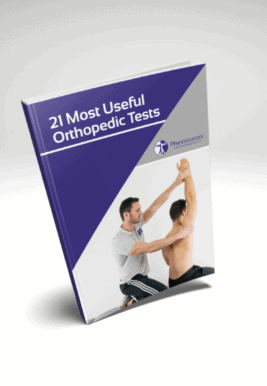Learn
Elbow Valgus Stress Test | Medial Collateral Ligament Assessment
The Elbow Valgus Instability Stress Test is an orthopedic test to assess the integrity of the medial or ulnar collateral ligament of the elbow. According to O’Driscoll et al. (2005), the test has a sensitivity of 65% and specificity of 50% to diagnose injuries of the MCL at the elbow when pain was used as an outcome measure. On the other hand, the test has a sensitivity of 19% and a specificity of 100% when laxity was used as an outcome. For this reason, this test is moderately useful to confirm, but not to exclude, MCL injuries of the elbow.
Execution: the patient is in standing position. Then, the examiner externally rotates the shoulder and fixates the upper arm from the outside, while palpating the ulnar/medial collateral ligament. The examiner grabs the wrist from the inside and flexes the elbow to 20°-30°. At last, the examiner applies an abduction / valgus force.
This test is scored positive in case of increased laxity (compared to the other side) and pain reproduction.
Other orthopedic tests to evaluate the integrity of the medial collateral ligament of the elbow are the Moving Valgus Stress Test and the Modified Milking Test.
21 OF THE MOST USEFUL ORTHOPAEDIC TESTS IN CLINICAL PRACTICE

Like what you’re learning?
BUY THE FULL PHYSIOTUTORS ASSESSMENT BOOK
- 600+ Pages e-Book
- Interactive Content (Direct Video Demonstration, PubMed articles)
- Statistical Values for all Special Tests from the latest research
- Available in 🇬🇧 🇩🇪 🇫🇷 🇪🇸 🇮🇹 🇵🇹 🇹🇷
- And much more!








